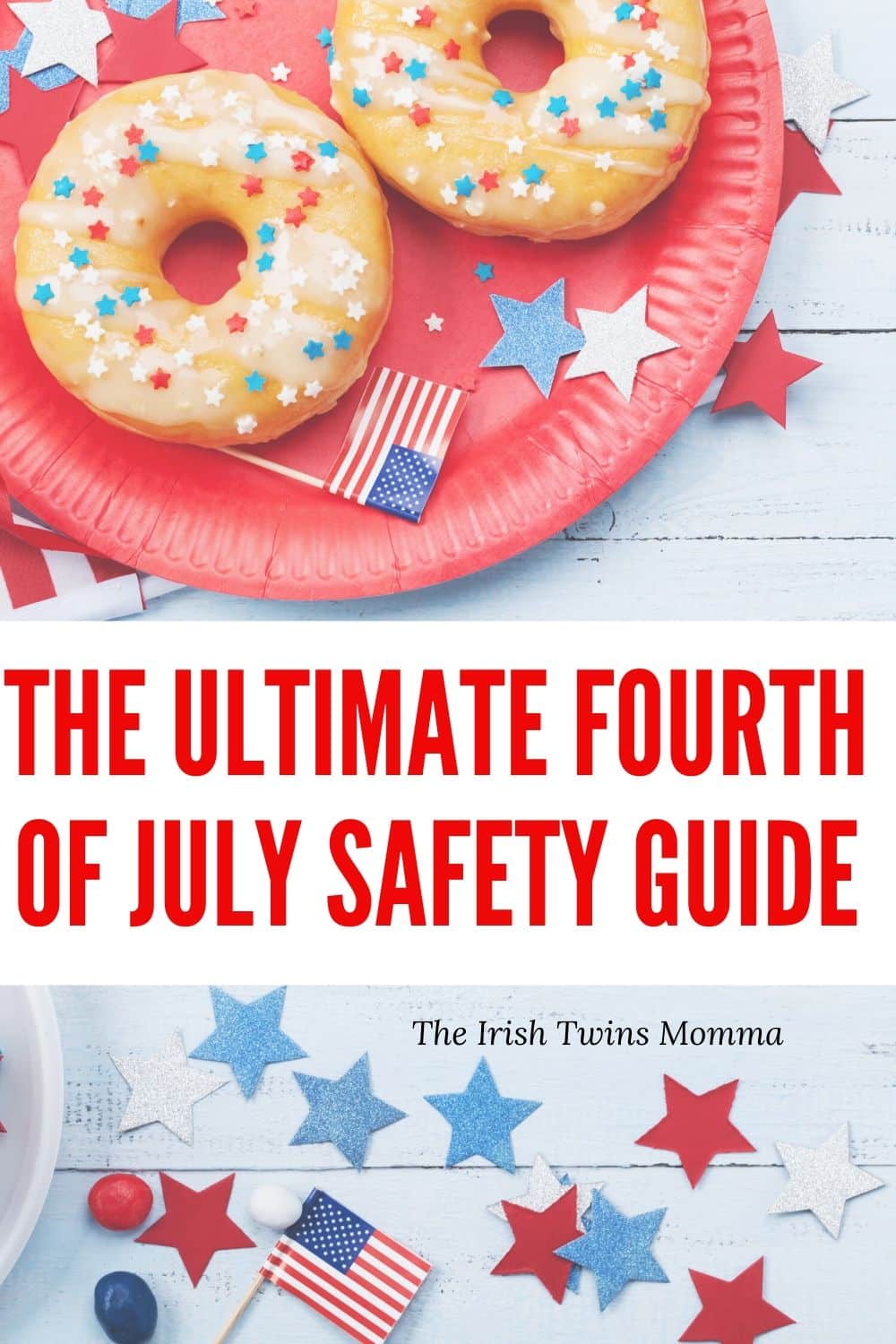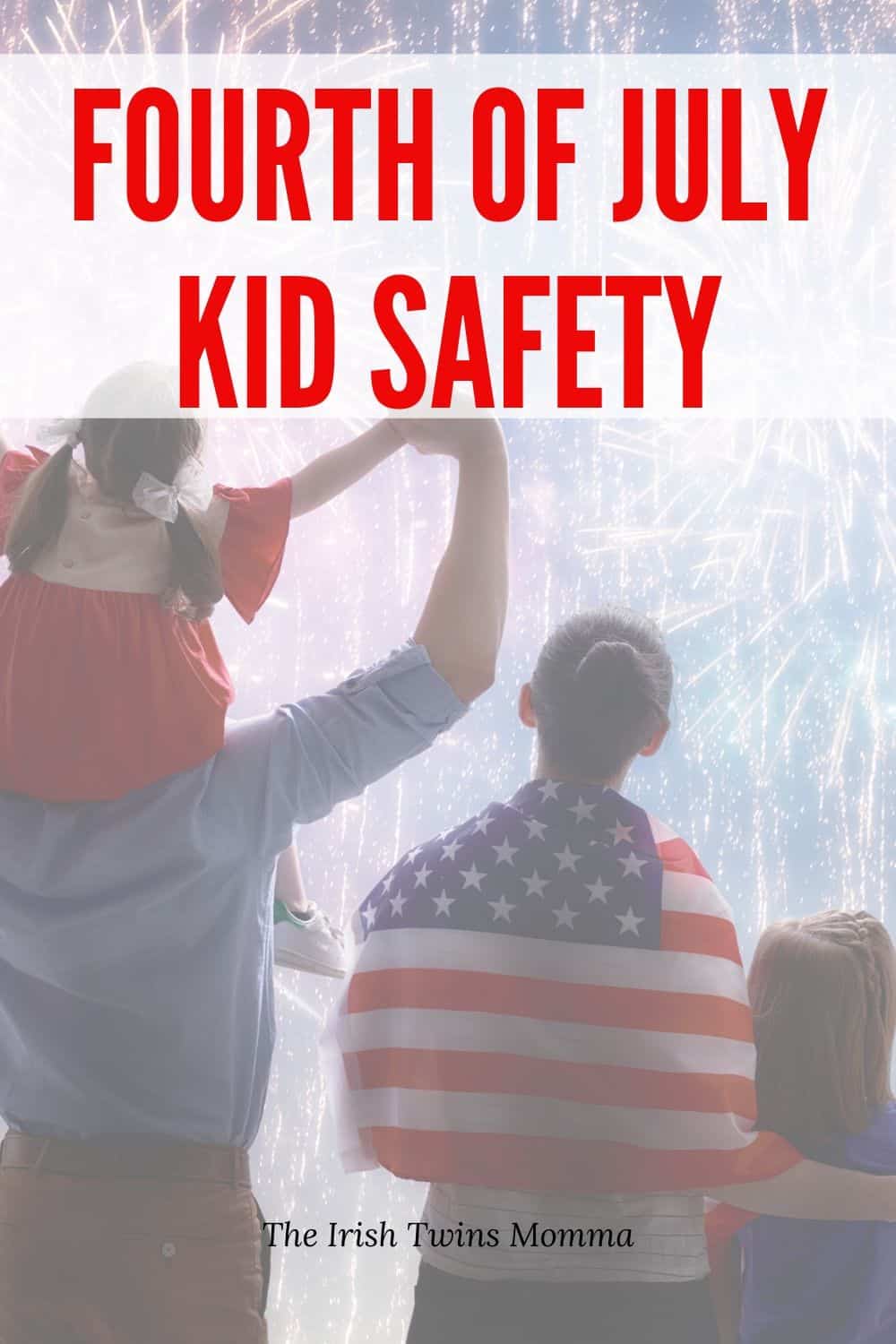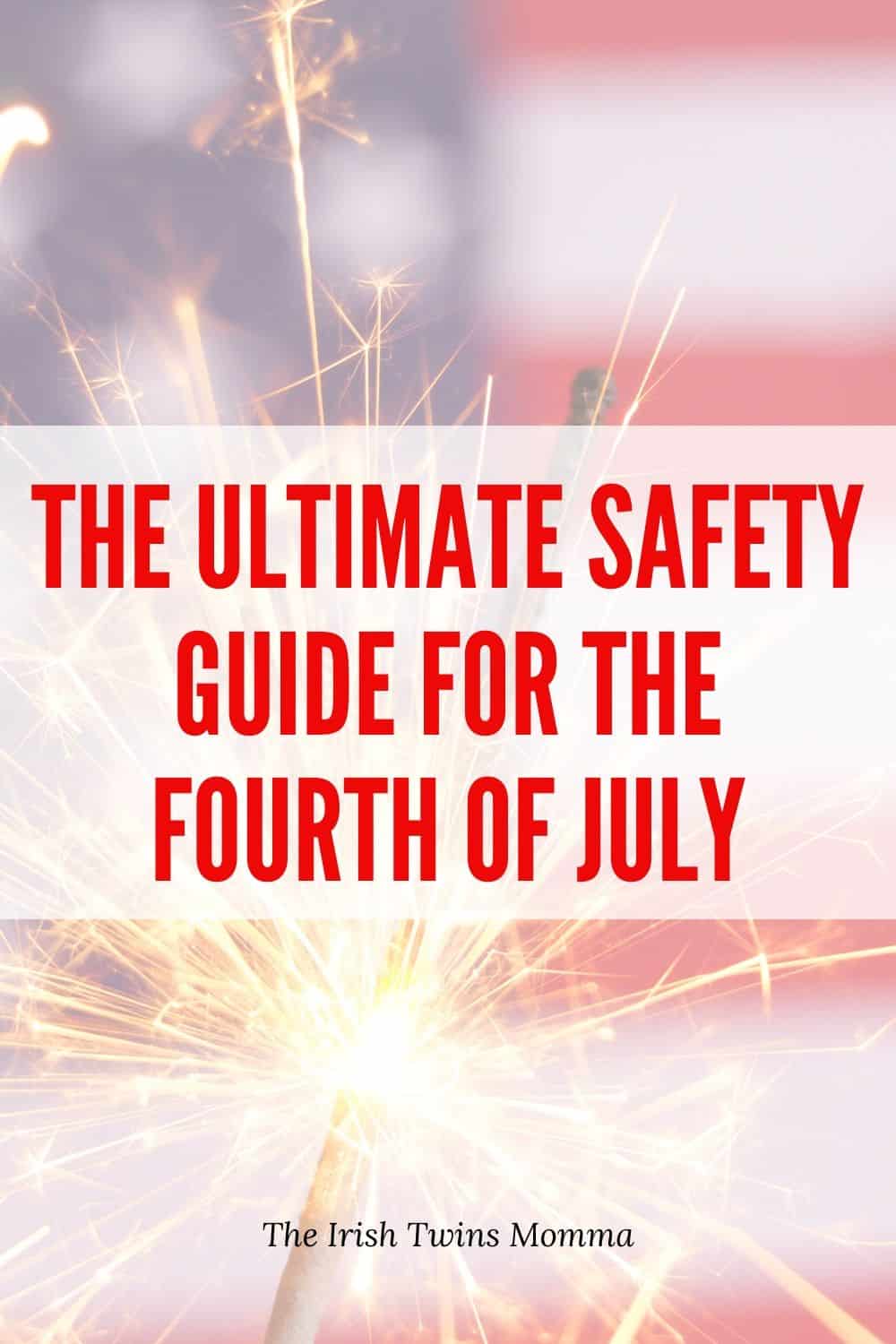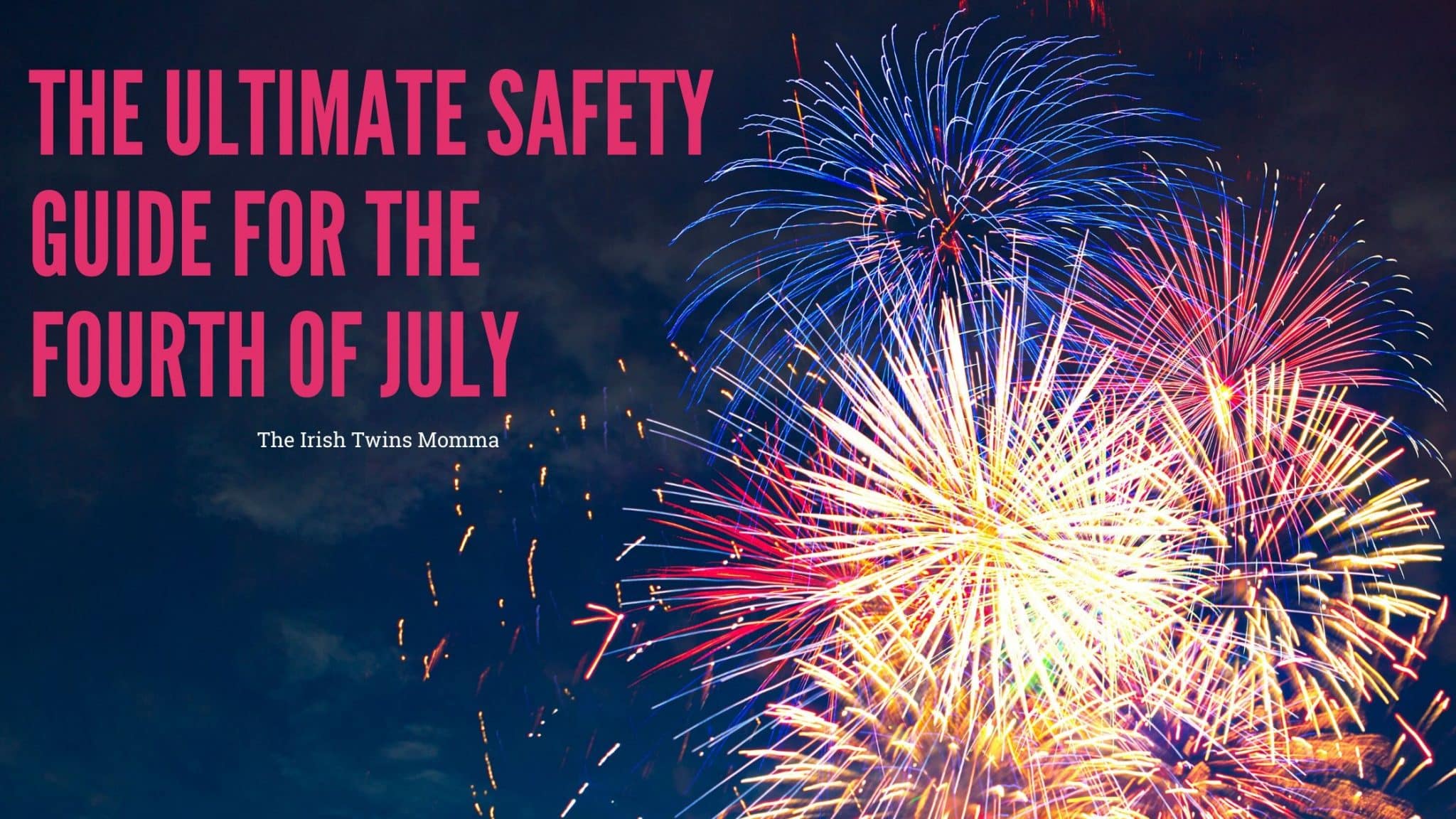This post contains affiliate links. If you click and buy, I may make a commission, at no cost to you. See my disclosure policy for more information.
When you start thinking about how you’re going to celebrate the Fourth of July with your loved ones, it probably doesn’t come to mind that it’s widely considered the most dangerous U.S. holiday. That doesn’t mean it can’t be a fun, relaxing time, but keeping festivities safe and sound will require some thought and discipline for your entire family. I’ve taken the guesswork out rounded up several tips that will help stave off disaster and keep your Independence Day joyous and carefree.
Firework Safety Tips
It’s a well-known fact that fireworks can be unsafe, so it may come as a surprise that 9,100 fireworks-related injuries were treated in hospitals in 2018. Whether using fireworks at home or attending a fireworks display, there are many safety tips to consider and take seriously before you decide to light up the night.
- Purchase only legal fireworks and abide by the consumer fireworks laws in your state. There could be fireworks curfew or limitations to the types of fireworks permitted.
- Before igniting fireworks, carefully read and follow the instructions on the package. The same goes for storage. Fireworks should be used only for their intended purpose, and should never be combined, altered, or homemade.
- The person in charge of lighting fireworks must be sober and wear safety glasses. They should ensure there is a fire extinguisher and hose or supply of water nearby.
- Light fireworks outside on a flat surface, and maintain a safe distance from people, structures, vehicles, and anything flammable (such as dry leaves or grass).
- If a firework doesn’t properly light, do not get close to relight it or figure out the problem. Before disposing of any used fireworks or “duds,” douse or soak them in water.
Kids and fireworks:
Don’t allow children to handle or light fireworks, firecrackers, or bottle rockets, and never leave children unattended with these items whether or not they are being used.
Always keep children at a safe distance from active fireworks, and go a step further by providing them ear protection to help with the noise.
It’s also best to not allow your children to use sparklers as they can cause burns or catch clothing on fire.
If you don’t follow these tips, your children may be more susceptible to injuries such as burns, skin lacerations, bone fractures and breaks, hearing loss, and eye injuries, or even vision loss. Minor cuts, burns, bumps, and bruises can be treated at home, but more severe injuries require emergency medical attention.
Pets and Fireworks
I think we all know that pets don’t care for fireworks. It’s best to leave pets safely indoors, distract them with the noise of the TV, and let them hide out in their favorite comfort spot—even if it’s on your newly sheeted bed!
Dog owners should also avoid taking their pets for walks at night when fireworks are likely to be going off.
Heat Safety Tips
Perhaps less obvious than fireworks, but still a very relevant and common risk to our health and safety in the hottest months of the year, are heat exhaustion, dehydration, and heatstroke. Paying close attention to your exposure to heat can prove even easier to forget on a carefree Summer holiday spent with friends—especially if the drinks are flowing.
- Stay hydrated at all times. It’s important to drink water all day long, particularly if you are consuming alcoholic beverages. For both adults and children, staying hydrated is the best way to prevent heat exhaustion or stroke. Your children probably have bounds of energy to run off on a beautiful Summer day, but check in with them frequently to make sure they are drinking fluids and taking the time to cool down and rest.
- Wear light, airy clothing and avoid dark colors that can absorb the harsh heat from the sun’s rays.
- Lounge in shaded, cooler areas and take a break in air conditioning if possible.
- Fainting, incoherent behavior, cold and clammy skin, nausea, and vomiting can be signs that a person has heat stroke and should be treated by a medical professional right away. While waiting, do what you can to decrease the person’s body temperature (i.e., remove excess clothing, immerse them in cold water, and apply ice packs to their neck and back).
Grilling Safety Tips
One of the best parts of the Fourth of July is breaking out the grill for a BBQ. Whether you’re a novice or know your way around a grill, there are several safety boxes to check off every year to ensure you are safely operating a grill to prevent fires, burns, and other grill-related injuries.
- Check your gas grill for any leaks or other damage, such as holes/cracks/brittleness in the hose, blockages caused by old grease, and dents and bulges in the propane tank.
- One way to test for leaks is to rub soapy water on the fuel line; bubbling = leak.
- Prevent fires by keeping the lid of your grill open when lighting it, and do not grill too much food at once (particularly fatty meats that can drip and cause a flare-up).
- Make sure there is enough space between the grill and the house (at least 10 feet), deck rails, and other structures.
- Never use a grill indoors (this includes garages, tents, and campers), under a porch or awning, or near branches.
- Be prepared to put out a fire just in case. Baking soda can help to smother a fire, but it’s best to also have an extinguisher handy. Never use water to attempt to tame a grease fire.
- Never leave the grill unattended and don’t allow children to get too close. If you need to step away from the grill, designate another adult to supervise the grill while you’re away.
- If you’re using a charcoal grill, keep lighter fluids capped and at a safe distance (and don’t add more once the coals are hot), never use gasoline as starter fluid, and wait at least 48 hours to dispose of used coals.
- When you’re done using your gas grill, make sure it is no longer on, let it cool before closing the lid, and take the time to properly clean it and remove any buildup of grease and fat.
Food Safety
Barbequing for loved ones can be a special experience, but only if food safety is made a priority.
-
- When handling raw meat and poultry, frequently wash your hands and use separate plates and tools.
- When cooking them, use a meat thermometer to determine if they have reached the proper internal temperature.
- After two hours of sitting out, perishable food should be tossed, and if it’s 90 degrees or more outside, you should err even more on the side of caution and make sure food is refrigerated after one hour to prevent creating a breeding ground for bacteria.
Kid Safety Tips
The presence of children during the Fourth of July celebrations adds another layer of worry for any parent. In addition to fireworks, heat, and grilling safety, here’s a breakdown of some practical safety precautions you can follow to protect your kids.
Sun and Skin Safety
Shield your children’s skin from harmful UV rays by generously applying sunscreen with an SPF of 30 or higher up to 30 minutes before sun exposure, and reapplying every two hours after that or immediately following any swimming or excessive sweating. Also make sure your children have access to shade whether under a tree, umbrella, or pop-up tent, and have them wear hats and sunglasses when possible.
Critter Safety
Don’t forget about bug and insect protection. Follow the instructions provided on the bottle and apply repellent to children 2 months and older. Always keep repellent and sunscreen out of your children’s reach.
Water Safety
When thinking about the risk of water-related injuries, and even death, the statistics provided online seem grim. However, I’ve compiled several easy-to-follow tips and resources that will keep your children safe in and around a pool and other bodies of water.
Crowd Safety
Your Fourth of July may not be complete without a trip to the beach or a fireworks display, but navigating crowds, especially for families with children, can be overwhelming. By following a few safety tips, you can keep your family out of harm’s way.
While it’s best to stay by your children’s side at all times, all parents know kids have a knack for slipping away unnoticed no matter how many times you explain to them how important it is that they remain close to you.
-
- Dress them in bright colors
- “label” them with their names and contact information
- Explain to them what to do if they get lost (for older kids, this could mean identifying a meeting spot; for younger kids, it might be best if they stay where they are or safely ask someone for help)
Travel Safety
I would be remiss to not talk about car safety as it relates to one of the most dangerous driving days of the year. If you plan to drive, please stay alert, off your phone, and aware of your surroundings at all times.
With fireworks visible from the road, more cars driving into the early morning hours of the night, and the excitement of friends and family filled day, it’s easy to get distracted. Be aware of other drivers who may be under the influence, and if you plan to drink, always assign a designated driver.
We all want the Fourth of July to be a joyful experience with happy memories for our children and loved ones to hold close for a lifetime. The best way to keep the focus on the positivity surrounding this holiday is to ensure their safety and well-being through some easy planning and preparation. I hope this guide serves as a one-stop-shop for all your safety-related concerns and questions. Wishing you a wonderful Fourth of July!
Sincerely,






Lindsay
Thank you for taking the guess work out of the safety component! We have enough to worry about like cute matching outfits and what snacks to feed all day 😉 THANK YOU!!! xo
The Irish Twin's Momma
Exactly! Especially since there isn’t firework shows now many places we still have to worry about fashion and food. 🙂